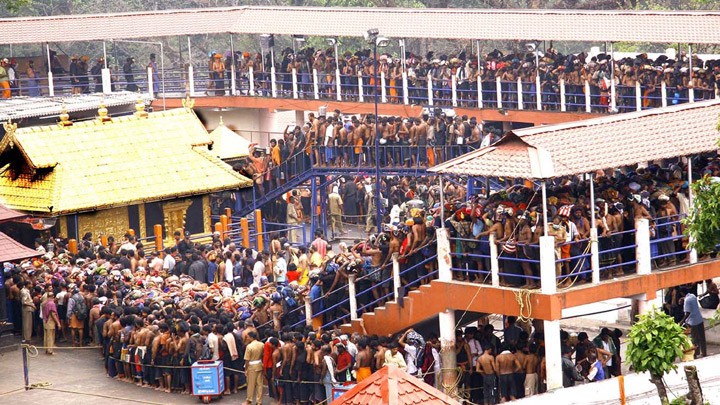
The talks between the Travancore Devaswom Board (TDB), the Pandalam royal family and the representatives of the Sabarimala Tantri family and other Hindu organisations to find a solution to the Sabarimala deadlock ended inconclusively on Tuesday.
Though there was no consensus, sources confirmed that the meeting was not at all futile and the board had not ruled out the option of a review petition. The meeting will now take place on October 19.
The royal family, it is learned, wanted the Devaswom board to file a review petition in the Supreme Court against its September 28 verdict which allowed entry of women of all age groups to the holy shrine.
Amidst all this, hundreds of devotees, including many women, checked vehicles heading to the Sabarimala temple near Kerala's Pathanamthitta this morning to ensure that no women were allowed to reach the temple.
Last month, the Supreme Court drew praise for a landmark judgment that threw the revered Lord Ayyappa shrine open to women of menstruating age. However, the decision wasn't universally popular -- and that's putting it rather mildly.
"We are determined that come what may, we will not allow a single lady in the age group of 10 to 50 to reach anywhere near the temple," said one woman in Nilakal, about 20 km from the temple, located in Pampa. Kerala has witnessed protests since the verdict, and one actor and BJP supporter said women coming to enter the temple should be ripped in half. He was later booked.
Temple authorities had said the ban on women of menstruating age was essential to the rites related to Ayyappa, considered eternally celibate. The Travancore Devaswom Board (TDB), the custodian of the temple, has so far maintained that if any woman in the banned age group turns up at the temple, they would be doing it only for publicity.
Today, two women journalists were prevented from travelling to the temple town, where their OB van was stationed.
Chief Minister Pinarayi Vijayan said the screening of vehicles was unacceptable. "The government will ensure that nothing of that sort will happen," he said. "Those who want to pray cannot be stopped."
"In Kerala, nobody has the right to restrict the freedom of movement or travel. If anyone ever tries to do that, we will deal with such incidents with [a] firm hand."
While the CM was assuring journalists about law and order in Thiruvananthapuram, a woman reportedly tried to hang herself from a tree in protest against the Supreme Court's verdict. She was saved.
The Sabarimala shrine is set to open on Wednesday (October 17) for monthly pujas. The Kerala BJP has been at the centre of protests against the September 28 Supreme Court verdict lifting the ban on entry of women saying it will breach age-old traditions.
Earlier, with protests growing, the Kerala BJP president PS Sreedharan Pillai warned the Pinarayi Vijayan government to resolve the issue of women visitors or face "severe consequences".
And Reshma Nishanth, the woman who is on a 41-day 'vratha' (fast) before taking part in the pilgrimage to the holy shrine, has maintained that she will not abandon her plans despite death threats that have come her way from various quarters.
But on the streets, the protests have just not stopped growing. Pandalam, home to the Pandalam royals who revere Ayyappa, the resident deity of Sabarimala, rang out with strident chants of 'Swami sharanam! Ayyappa sharanam!'.
They were also joined by thousands of women blocking roads and other routes leading to the Sabarimala shrine. In lead up to today, demonstrations took place in Thiruvananthapuram, Alappuzha, Kottayam, Kochi and Palakkad.
A 'Save Sabarimala' campaign launched by the devotees vowed to block women of 'inappropriate age' from entering the shrine.
History of the case
When the Sabarimala case first came up for hearing in 2011, the then Congress-led United Democratic Front government had endorsed the views of the Pandalam royals and Sabarimala chief priest's family that women of 'menstrual age' be barred from the temple.
This was based on the traditional belief that Ayyappa is celibate. At that time, both the RSS and the BJP were in favour of removing the restrictions against women in temples


.jpeg)

